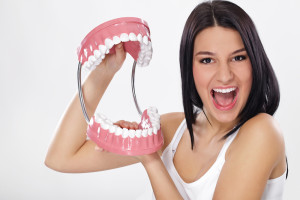 If you visit your dentist regularly, then you are probably aware that there a more dental issues that can afflict your mouth than most people are aware of. While caring for your teeth and gums should be an integrated part of your daily routine, there are other considerations for the health of your mouth, such as the alignment of your jaws, or habits that may prove detrimental to your smile’s foundation. For instance, bruxism and TMJ disorder can cause significant dental damage, and have a dramatic impact on your bite’s proper function.
If you visit your dentist regularly, then you are probably aware that there a more dental issues that can afflict your mouth than most people are aware of. While caring for your teeth and gums should be an integrated part of your daily routine, there are other considerations for the health of your mouth, such as the alignment of your jaws, or habits that may prove detrimental to your smile’s foundation. For instance, bruxism and TMJ disorder can cause significant dental damage, and have a dramatic impact on your bite’s proper function.
Complications of the Jaw (TMJ Disorder)
Your mouth’s function is governed by the movement or your jaw. The large joints situated in front of each ear connect your lower jaw, or mandible, to the temporal bones in your skull. Together with the muscles that surround them, these temporomandibular joints, or TMJs, are responsible for the wide range of movement your jaw enjoys when it’s working properly.
Undue pressure can place more stress on these joints than they’re made to endure, and a number of different factors can damage your TMJs or knock them out of proper balance. One of these factors is a common dental condition known as bruxism (tooth-grinding).
Complications with Your Bite (Bruxism)
Clenching your jaws is normal under stressful conditions. For instance, when you’re angry or upset, your entire body may tense up, including the muscles in your jaw. Habitually clenching and grinding your teeth (bruxism), however, becomes a problem when your TMJs begin to suffer under the pressure. The resulting discomfort, which can affect your face, jaws, teeth, head, neck, shoulders, and more, is called TMJ disorder, and can often be debilitating.
More than Your Teeth can Take
Aside from damaging your jaws, bruxism can also excessively wear down your teeth. Enamel, which surround and protects your teeth from bacteria and food debris, can crack or fracture under the pressure, leaving your tooth vulnerable to decay. If you’ve previously had dental work done, such as a filling, dental bonding, or dental crown, then grinding your teeth can also damage your restorations, forcing you to acquire new ones.







